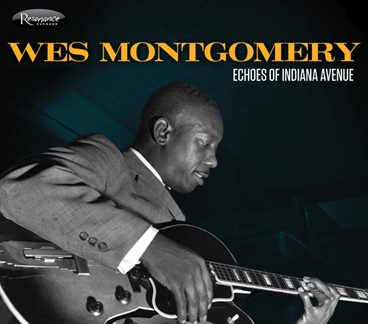88 years ago, March 6th, Wes Montgomery was born. It was no accident that this album was released then. The holy trinity of jazz guitarists is widely acknowledged as being Django Reinhardt, Charlie Christian and Wes. Here we get a sample of his earliest recordings, and the first full album of ‘new’ material in 25 years. This isn’t the same old hash, remixed, rearranged and served up to an undying public. These recordings haven’t been heard by the general public and the original tapes were thought to be lost. These tapes are the earliest known recordings of Montgomery as a leader and pre-date his 1959 debut on Riverside Records.
Recorded in 1957-1959 at night clubs in his home town of Indianapolis (they have this to celebrate, even if they are letting a different kind of legend slip away). There are also some rare studio recordings. The mystery of how these long lost tapes were rediscovered almost pushes this post into the book report topic. It is surely worthy of it. It’s a tale of intrigue, with twists, turns, false leads and it’s enthralling to say the least.
The identity of the person who made the tapes still remains unknown, although he or she clearly possessed more than an amateur amount of knowledge about professional recording. The tapes passed through a number of hands, some international, and most owners only rumored, before being acquired in 1990 by guitarist Jim Greeninger, who is also a huge fan. It wasn’t until 2008, after Greeninger had tried to sell the tapes on eBay, that he contacted Michael Cuscuna, a well respected producer with Blue Note Records. Cuscana contacted Zev Feldman at Resonance Records, and the first thing they did was transfer the fragile tapes to digital. Then between 2010 and 2011, they worked on restoring the music, making trips to Indie to interview and discuss the recordings with scholars, musicians and friends of Wes’ .
Wes Montgomery came to the guitar relatively late in life, 20 years of age. But, he came from a musical family. His brothers, Monk a bassist and Buddy a piano player were well respected in the jazz community. Also, all indications are that Wes had mastered the four string, tenor guitar as early as the age of 13 and it was probably on that instrument that he taught himself to pick out complex melodies and riffs by ear. From there, he took the use of octaves and chord melodies to a greater level than any other guitarist, before or since.
As jazz guitar was becoming less rare in jazz circles in the bebop/post-bop era, and made acceptable by players such as Tal Farlow, Johnny Smith, Jimmy Raney, and Barney Kessell. These players quickly stopped recording for the most part in the ‘60s, but it was then that Wes became most prolific. He adapted and improvised on the same music that Miles Davis and John Coltrane were creating in the wake of bop. he even gave a jazz touch to pop songs of the mid to late ‘60s, “Eleanor Rigby” being one that comes to mind. As the leader of his own group, and as a contributor to projects by Miles, Coltrane, Milt Jackson, and as a co leader on projects with Jimmy Smith, he laid down a catalog of music between 1959 and his death in 1968 that comprise some of the greatest jazz guitar tracks ever recorded. His influence is still being felt on jazz guitar and on guitar regardless of genre.
Pat Martino, George Benson, Russell Malone, Emily Remler, Kenny Burrell, Pat Metheny, Steve Howe, and Jimi Hendrix, Stevie Ray Vaughn, Eric Johnson, Joe Satriani, David Becker, Joe Diorio, Steve Lukather and Lee Ritenour all credit him as a major influence. And for good reason. Listening to Wes solo is like teetering at the brink of some musical abyss. Yet he always felt in control. His playing during his peak was almost unbearably breath-taking and daring.
Montgomery toured with Lionel Hampton's orchestra from July 1948 to January 1950, and can be heard on recordings from this period. Montgomery then returned to Indianapolis, took a “day job” at a factory to feed is large family, and did not record again until December 1957 (save for one session in 1955), when he took part in a session that included his brothers Monk and Buddy, as well as trumpeter Freddie Hubbard, who made his recording debut with Montgomery. His first few recordings were as The Montgomery Brothers, and either Monk or Buddy often recorded with him after then.
On Echoes of Indiana Avenue we get a taste of the early Wes. These recording, not heard for ages by any but the various owners of the tapes, were made at night clubs in Indianapolis; four tracks at The Hub Bub Club, a long forgotten jazz club on Indiana Avenue, the main, black commercial strip in Indie in the ‘40s and ‘50s. Two of the tunes are rare recording studio sessions, never released. This is straight ahead jazz. It swings with a ferociousness, it swings like it’s never gonna stop. It’s organic, and gives a peek at Montgomery’s Bebop side. There is even the only known recorded traditional blues guitar licks by the man! It is nasty and came up out of the earth and it is sublime.
What you hear is Montgomery’s fantastically fluid, horn like single note runs, which had no room for errors. He employs other techniques, but one that stands out, even today, is he used no pick, choosing to finger pick the electric guitar. He used his thumb, both for down strokes as well as up. This gave him a warm, rounded tone and became his trade mark known as the “Naptown Sound”.
This CD package is very well put together, the music is not only surprisingly clean and clear and dynamic in texture, considering the period the original tapes were made. And it comes with a 24 page booklet containing never released photos as well as essays reflecting on Wes, including Pat Martino and Wes’ brothers, Monk and Buddy. If you are a jazz fan, or even a casual listener, this is must have stuff.
Copyright © 2012 Robert Carraher All Rights Reserved





No comments:
Post a Comment